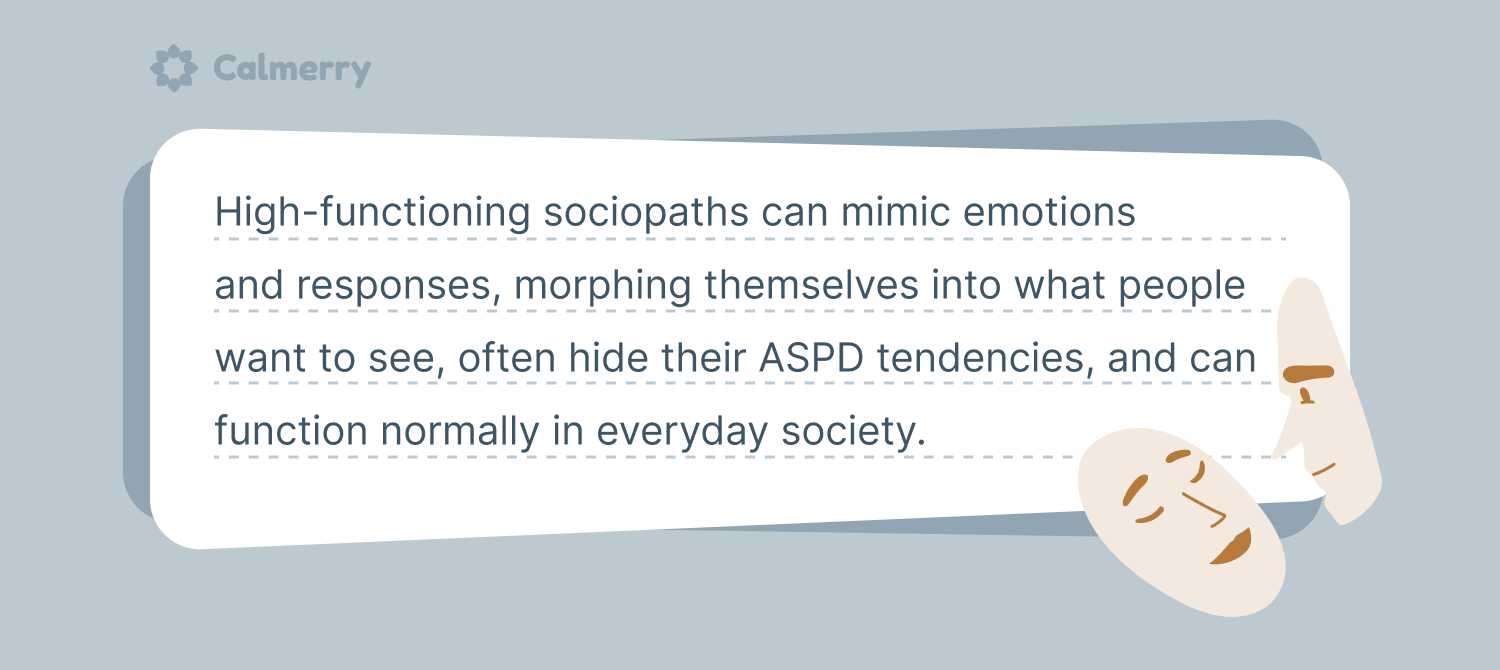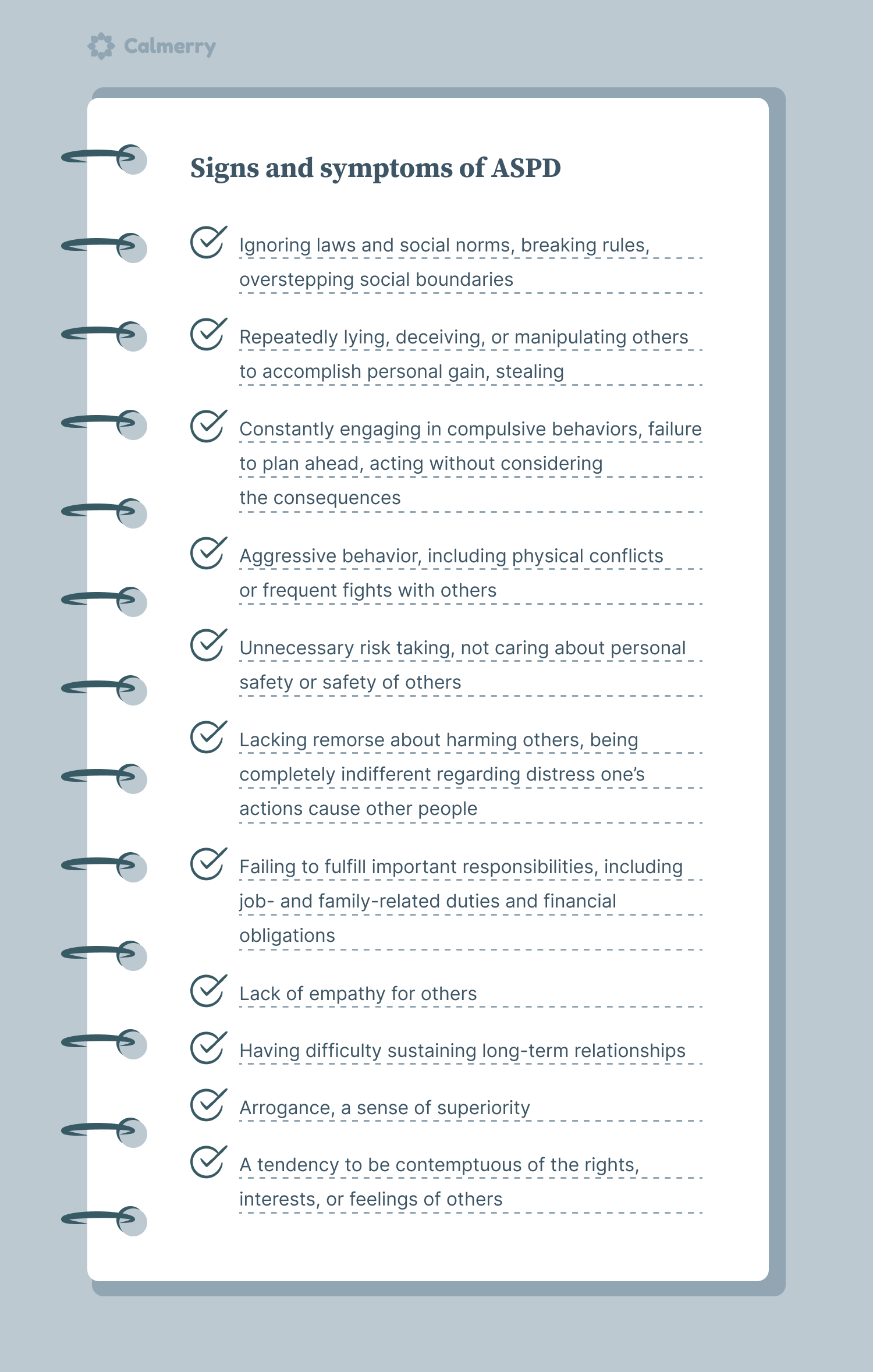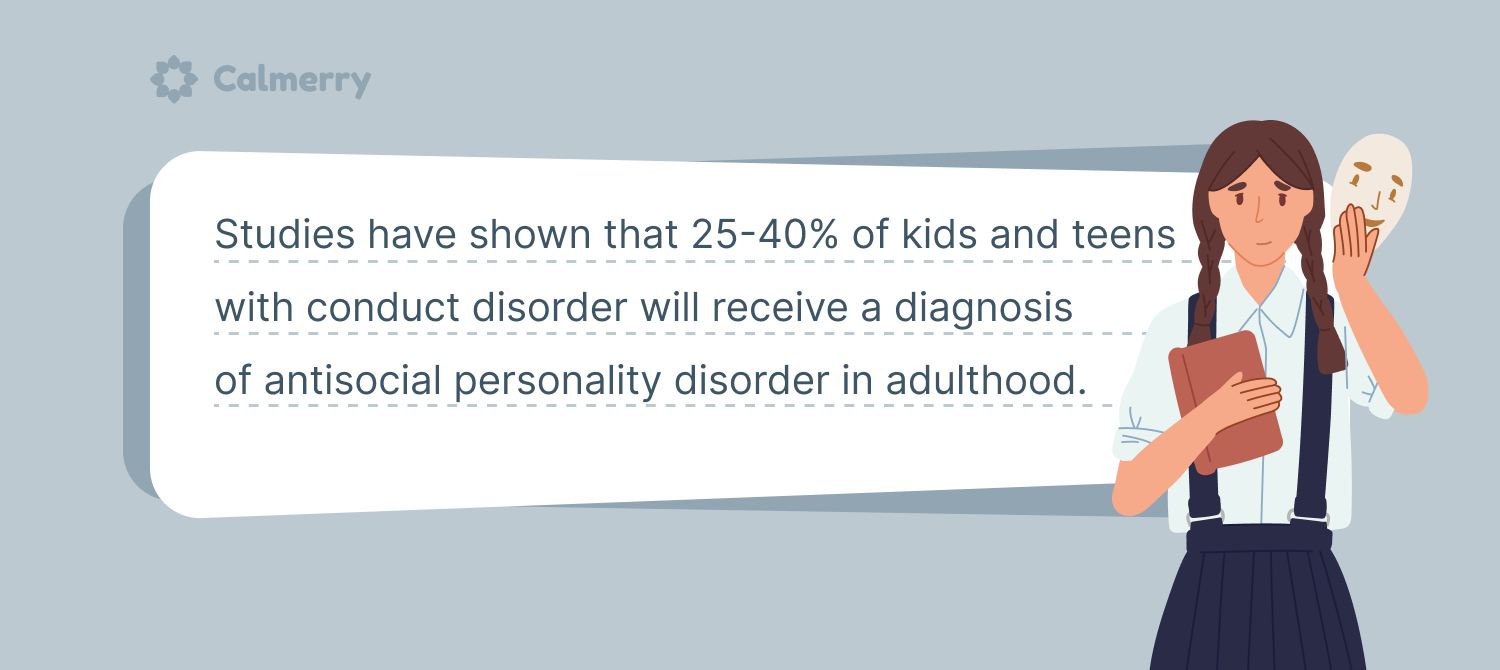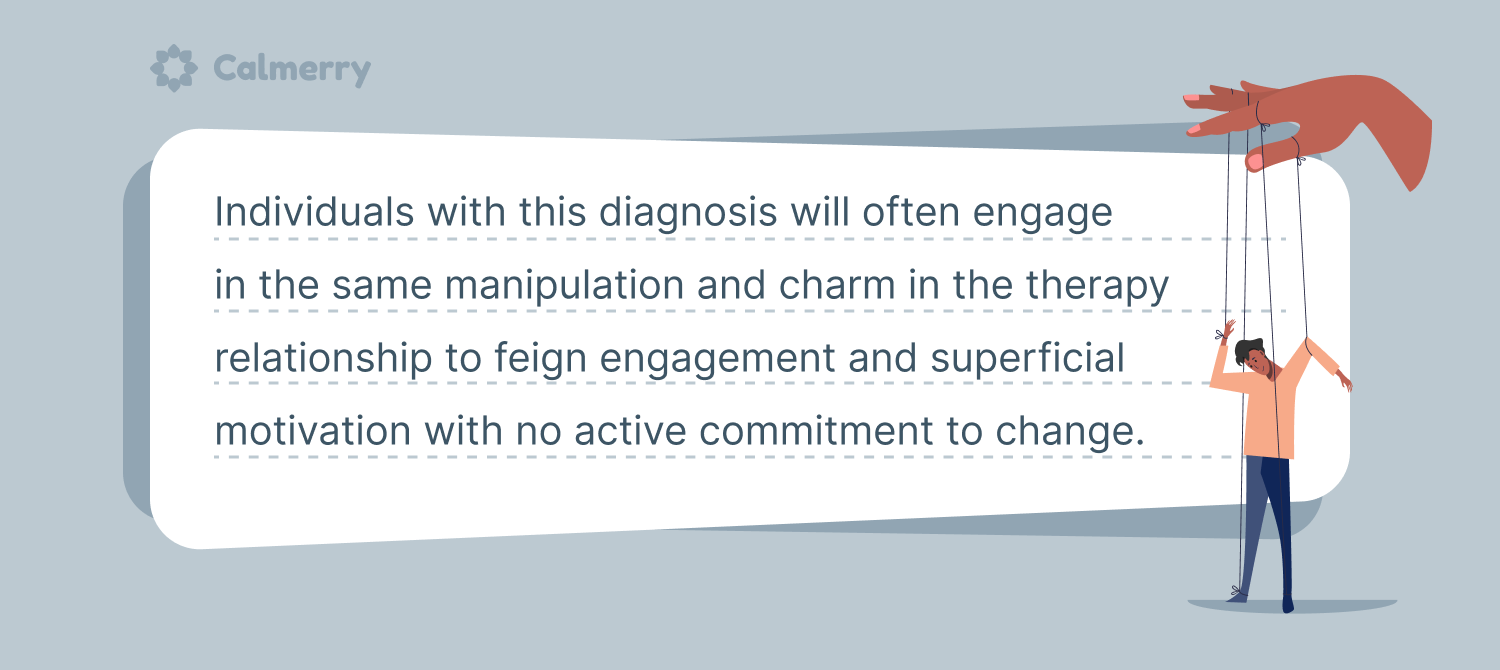What Is a High-Functioning Sociopath?

In this article
Sociopathy is known as an antisocial personality disorder (ASPD) and refers to a pattern of antisocial behaviors and attitudes. According to some estimates, ASPD occurs in approximately 1-4% of the general population, and men are 3 to 5 times more likely to be diagnosed with the disorder than women.
At some point in your life, you may have met someone who doesn’t seem to care about your feelings, rights, or social norms. Sociopaths lack an understanding of what is right and wrong no matter who gets hurt and don’t feel guilty because of their violent behavior.
The defining characteristic of sociopaths is a lack of conscience. Sociopaths have difficulty feeling empathy, only care about themselves, and often use such tactics as lying, cheating, and manipulation to get what they want, ignoring the rules and laws of society.
But not all sociopaths are created equal because antisocial personality disorder exists along a spectrum. The sociopath spectrum can range from minor transgressions to criminal behavior, and people with high-functioning ASPD are exceptionally skilled at being who they are.
What is a high-functioning sociopath?
In fact, the terms “high-functioning” and “low-functioning” have no clinical meaning. In the DSM-5 (Diagnostic and Statistical Manual of Mental Disorders) published by the American Psychiatric Association, an antisocial personality disorder is not categorized as high or low functioning.
So, these adjectives simply describe the level of severity of the sociopathic behavior.
High-functioning sociopaths carry all the same characteristics as sociopaths, except that they’re not as easy to spot in social settings. They can mimic emotions and responses, morphing themselves into what people want to see, often hide their ASPD tendencies, and can function normally in everyday society.
In this sense, some would argue that they have intellectual empathy though they lack the capability for emotional empathy. Meaning that they logically can know and anticipate what others may feel and use this to manipulate others, though they struggle to feel this themselves or care.
They tend to be in relationships and can start families, have children, and hold jobs.

Low-functioning sociopaths
Low-functioning sociopaths aren’t as adept in social situations as high-functioning sociopaths and don’t exhibit polished and polite behaviors to mask their manipulations.
They may lack the education or interpersonal skills necessary to manipulate and control other people, so they often use threats, coercion, intimidation, and even violence to achieve their goals.
High-functioning sociopath traits
- Superior intelligence – high-functioning sociopaths are often very smart and have very high IQs
- Impeccable social skills – they are charming, and although they don’t enjoy being around people, they may come across as friendly and outgoing
- Calculating behaviors – they are driven and determined; they know what they want and how to get it, so they always assess situations and purposely plan their actions
- Lack of empathy – they don’t understand the emotions of other people, so they don’t appreciate or anticipate the consequences of their actions
- Highly sensitive – high-functioning sociopaths are vulnerable to criticism because they crave admiration and praise from other people; they can be defensive and may burst with anger when they don’t have someone’s approval
- Highly secretive – they reveal private information or thoughts only if it’s to manipulate another person
- High impulsivity – they live in the present and always focus on their immediate objective; they fail to consider potential negative consequences or adverse reactions
- Addictive behaviors – high-functioning sociopaths may have problems with gambling, sex, alcohol and drugs abuse
Common things sociopaths say
Gaslighting phrases
- “You’re just being paranoid.”
- “That never happened.”
- “You’re overreacting.”
- “You’re imagining things.”
- “You’re too sensitive.”
- “No one else thinks that way.”
Charm and flattery
- “You’re the only one who understands me.”
- “I’ve never met anyone like you.”
- “You’re so special.”
- “You’re perfect for me.”
- “You’re different from everyone else.”
- “I can’t believe how lucky I am to have found you.”
Playing the victim
- “People always misunderstand me.”
- “Everyone is against me.”
- “I’m always the one who gets hurt.”
- “Nobody ever gives me a chance.”
- “Why does this always happen to me?”
- “I’m just trying to do the right thing, but people keep attacking me.”
Deflecting blame
- “It’s your fault that this happened.”
- “If you hadn’t done that, I wouldn’t have reacted this way.”
- “You made me do it.”
- “You always push my buttons.”
- “If you weren’t so difficult, I wouldn’t have to act like this.”
- “This wouldn’t be a problem if you just listened to me.”
Minimizing their actions
- “You’re making a big deal out of nothing.”
- “It’s not as bad as you’re making it out to be.”
- “I was just joking.”
- “You’re blowing this out of proportion.”
- “It was just a small mistake.”
- “You’re acting crazy over nothing.”
Promising change (without real intention)
- “I promise I’ll change.”
- “This will never happen again.”
- “I’ll do better next time.”
- “I know I messed up, but I’m going to fix it.”
- “I’ll work on it, I swear.”
- “Give me one more chance, and I’ll prove it to you.”
Manipulative phrases
- “If you really loved me, you would…”
- “You’re the reason I’m doing this.”
- “Don’t you want to make me happy?”
- “If you leave me, I’ll have nothing.”
- “No one else would ever put up with you.”
- “You owe me for everything I’ve done for you.”
Can sociopaths love?
Sociopaths may display behaviors that resemble love, their capacity for genuine, selfless love is typically limited by their lack of empathy and emotional depth. Their relationships may often be superficial and self-serving.
In some cases, sociopaths might feel a form of attachment or affection towards certain individuals, such as family members or romantic partners. But these feelings are often inconsistent and can change if the sociopath perceives a threat to their own needs or interests.
Can sociopaths feel empathy?
Sociopath generally have significant impairments in their ability to feel empathy. But the extent and nature of this impairment can vary.
Sociopaths can have cognitive empathy, which means they can intellectually understand what others are feeling. They can recognize emotions in others and understand social cues. This ability often allows them to manipulate and exploit people effectively, as they can predict and influence others’ responses.
Again, not all sociopaths are the same, and there can be variability in their ability to experience and express empathy.
How are sociopaths different from psychopaths?
The terms “sociopath” and “psychopath” are often used interchangeably in common speech as labels for people with antisocial personality disorder. But neither of them is an official clinical term found in the Diagnostic and Statistical Manual of Mental Disorders (DSM) that healthcare providers use to diagnose mental health conditions.
That means that no one can be clinically diagnosed as a “sociopath” or “psychopath,” although there are psychopathic tendencies and behaviors.
The terms are also used in the scientific literature, but they aren’t well-defined.

Both sociopathic and psychopathic people have an antisocial personality disorder. And the current belief is that psychopaths have a more severe form of ASPD than sociopaths.
It is agreed that psychopathy is inborn and generally comes from genetic factors when parts of the brain responsible for emotion regulation and impulse control aren’t developing fully. In contrast, sociopathy results from primarily environmental factors, such as verbal, sexual, or physical abuse or severe trauma experienced in childhood.
Psychopaths are emotionally detached, calculating, unable to form or maintain genuine bonds, and are more likely to commit acts of violence.
Sociopaths are more erratic and prone to impulsive behavior. They have some sense of morality, may experience limited empathy, and are able to form an attachment to a particular person or group.
What is antisocial personality disorder?
Antisocial personality disorder, or ASPD, is one of 10 personality disorders that fall into three clusters that include:
- Odd, eccentric personality disorders (Cluster A)
- Dramatic, emotional, erratic personality disorders (Cluster B)
- Anxious, fearful personality disorders (Cluster C)
ASPD is Cluster B personality disorder. The other personality disorders found in this cluster include narcissistic personality disorder, borderline personality disorder, and histrionic personality disorder.
Antisocial personality disorder is a life-long condition that typically begins during childhood or early adolescence and continues into adulthood.
Like other types of personality disorder, ASPD exists on a spectrum, so it can range in severity from occasional bad behavior to repeatedly breaking the law and committing serious crimes.

ASPD signs
ASPD is characterized by an abiding pattern of disregard for and violation of the rights of others. Signs and symptoms of ASPD, present since age 15, may include:
- Ignoring laws and social norms, breaking the rules, overstepping social boundaries
- Repeatedly lying, deceiving, or manipulating others to accomplish personal gain, stealing
- Constantly engaging in compulsive behaviors, failure to plan ahead, and acting without considering the consequences
- Aggressive behavior, including physical conflicts or frequent fights with others
- Unnecessary risk-taking, not caring about personal safety or the safety of others
- Lacking remorse about harming others, being completely indifferent regarding the distress one’s actions cause other people
- Failing to fulfill important responsibilities, including job- and family-related duties and financial obligations
- Lack of empathy for others
- Having difficulty sustaining long-term relationships
- Arrogance, a sense of superiority
- A tendency to be contemptuous of the rights, interests, or feelings of others
How is antisocial personality disorder diagnosed?
Typically ASPD isn’t formally diagnosed before the age of 18 because the personalities of children are constantly evolving. But antisocial (or sociopathic) traits and tendencies in kids and teens are sometimes described as conduct disorder.
One of the criteria for ASPD is that Conduct Disorder is present by history before age 15.
Signs and symptoms of conduct disorder include serious, persistent behavior problems, such as:
- Aggressive behavior toward people or animals
- Deceitfulness or theft
- Destroying property for no reason
- Serious violations of rules without thinking about the consequences
Not all children or teens diagnosed with conduct disorder will have ASPD symptoms as adults. Studies have shown that 25-40% of kids and teens with conduct disorder will receive a diagnosis of antisocial personality disorder in adulthood.
Lastly, the criteria are met if the individual’s antisocial behavior also does not occur in the context of another diagnosis of schizophrenia or bipolar disorder.

Is there treatment?
Antisocial personality disorder is widely considered one of the most difficult disorders to treat. Currently, there’s no cure for sociopathy, but sometimes, the behavior of people with ASPD can be managed and treated, although the success depends on their willingness to participate in treatment and the severity of their symptoms.
Individuals with this diagnosis will often engage in the same manipulation and charm in the therapy relationship to feign engagement and superficial motivation with no active commitment to change. Leaning into this dynamic openly in the therapy relationship can be critical.
But the problem is that most high-functioning sociopaths won’t seek treatment because they don’t think there’s anything wrong with their behavior. They may notice that they get into trouble or that their partners are not happy with them. But people with ASPD tend to blame other people and other circumstances.
Often, individuals with this diagnosis end up in treatment due to interaction with the legal system. Mental health treatment is often mandated during their incarceration, as part of their court sentence, and/or as terms of their parole or probation.

Psychotherapy
Treatment depends on each person’s particular situation and may include psychotherapy and medications. Therapy can include interventions to manage anger and violence and treatment for alcohol or substance misuse.
But it’s not always effective, especially if a person has severe symptoms. Psychotherapy can only be beneficial if the patient recognizes the issue and wants change.
Typical approaches include cognitive behavioral therapy (CBT), mentalization-based therapy (MBT), and democratic therapeutic communities (DTC).
Medication
As to medications, there are no drugs specifically approved by the Food and Drug Administration to treat antisocial personality disorder.
Medical professionals may prescribe medications for some conditions that are associated with antisocial personality disorder, for example, anxiety or depression, or for symptoms of aggression.
How to deal with someone who has ASPD
If you suspect someone in your life has ASPD, and their destructive behavior directly affects you, the best thing you can do is to take care of yourself and protect your mental well-being.
You may not be able to convince them to seek treatment because they may not realize what they’re doing is abnormal, and they definitely don’t care if their bad behavior hurts you.
You can’t “fix” another person if they’re not motivated to change. So, if you’re in a relationship with someone with ASPD and they refuse to get help, you should seriously consider the negative consequences of staying in the relationship in your life.
Consider reaching out for support through Calmerry, connecting with a therapist who can guide you in recognizing toxic patterns and manipulation. It’s crucial to learn how to set boundaries, protect yourself, and move forward to build your life.
online therapy
live video session



